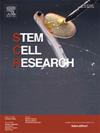Generation of two iPSC lines with pathogenic DMD nonsense mutations c.4729C>T and c.5713G>T
IF 0.7
4区 医学
Q4 BIOTECHNOLOGY & APPLIED MICROBIOLOGY
引用次数: 0
Abstract
Duchenne muscular dystrophy (DMD) is an X-linked genetic disorder characterized by progressive degeneration of skeletal and cardiac muscles, typically beginning in early childhood. Here, we describe the generation of two isogenic induced pluripotent stem cell (iPSC) lines engineered using CRISPR-Cas12 to introduce specific nonsense mutations in the DMD gene: c.4729C>T (p.Arg1577Ter) and c.5713G>T (p.Arg1905Ter). The edited iPSC lines retain normal karyotypes, express key pluripotency markers, and exhibit the capacity to differentiate into derivatives of all three germ layers. These models provide powerful tools for investigating DMD pathogenesis, uncovering mechanisms of genetic compensation, and evaluating potential therapeutic strategies.
具有致病性DMD无义突变c.4729C>T和c.5713G>T的两个iPSC系的产生。
杜氏肌营养不良症(DMD)是一种以骨骼肌和心肌进行性变性为特征的x连锁遗传疾病,通常始于儿童早期。在这里,我们描述了两个等基因诱导多能干细胞(iPSC)系的产生,使用CRISPR-Cas12在DMD基因中引入特异性无意义突变:c.4729C>T (p.a g1577ter)和c.5713G>T (p.a g1905ter)。经过编辑的iPSC细胞系保留了正常的核型,表达了关键的多能性标记,并表现出向所有三种胚层的衍生物分化的能力。这些模型为研究DMD的发病机制、揭示遗传补偿机制和评估潜在的治疗策略提供了有力的工具。
本文章由计算机程序翻译,如有差异,请以英文原文为准。
求助全文
约1分钟内获得全文
求助全文
来源期刊

Stem cell research
生物-生物工程与应用微生物
CiteScore
2.20
自引率
8.30%
发文量
338
审稿时长
55 days
期刊介绍:
Stem Cell Research is dedicated to publishing high-quality manuscripts focusing on the biology and applications of stem cell research. Submissions to Stem Cell Research, may cover all aspects of stem cells, including embryonic stem cells, tissue-specific stem cells, cancer stem cells, developmental studies, stem cell genomes, and translational research. Stem Cell Research publishes 6 issues a year.
 求助内容:
求助内容: 应助结果提醒方式:
应助结果提醒方式:


